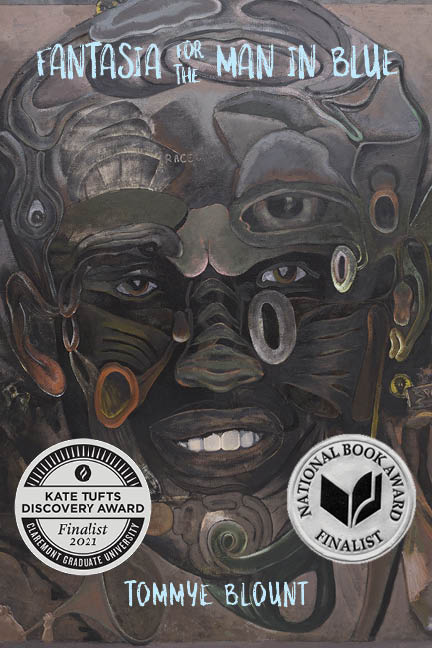
paper • 152 pages • 16.95
ISBN-13: 978-1-945588-49-5
Fantasia for the Man in Blue
Tommye Blount
Finalist for the National Book Award in Poetry.
Finalist for the Kate Tufts Discovery Award in Poetry.
Finalist for the Hurston/Wright Legacy Award in Poetry.
Finalist for the Publishing Triangle Thom Gunn Award for Gay Poetry.
Finalist for the Lambda Literary Award in Gay Poetry.
Finalist for the Julie Suk Award.
Finalist for the 2020 Big Other Book Award for Poetry.
Longlisted for the Believer Book Award in Poetry.
Featured in Poets & Writers.
Received a starred review in Booklist.
Received a starred review in Publishers Weekly.
The bug
lands on my pretty man’s forearm. Harmless,
it isn’t deadly at all; makes his muscle flutter
—the one that gets his hand to hold mine, or
ball into a fist, or handle a gun. It’s a ladybug,
or an Asian Lady Beetle everyone mistakes
for a Ladybug—eating whatever
it lands on. My pretty man is asleep—at ease, or
plotting like the bug. Or maybe the bug
is a blowfly—eating my pretty man’s tan
from his pretty arm. My man swats it
without waking, as if he’s dreaming of an enemy,
or me. When my pretty man isn’t asleep
he’s got a temper.
No, he is not
asleep. He’s wide awake and wants me to tell you
I’m wrong. Blowflies don’t eat skin,
they lay eggs on skin. He knows all about
blowfly larvae. Napoleon used them
to clean war wounds, my cold pretty man
says in that pretty way,
with his cold pretty mouth. He’s eaten plenty
of bugs before. On night watch,
over there. Over there, they’re everywhere.
…Tommye Blount is one of our greatest writers because he is willing to do what is so difficult: hold poems to exacting and crucial standards. This book was written not by a master, but a virtuoso.
…These poems, a cocktail not only of urban gothic but also of a sublime fantasia, will change how we listen to the world around us and teach us the uses of its enchantment.
We have waited a long time for a full collection of the evocative provocations of Tommye Blount to be released. Poem by poem Blount’s first book has become one of the most anticipated books of poetry of his generation. Fantasia for the Man in Blue does not disappoint. …
Tommye Blount’s lyrics seem to live outside space and time, blending references to history, art, and contemporary concerns into expanding galaxies on the page….
…the searing debut from Blount is magnetic and controlled. Through charged words, masterful line breaks, and ekphrasis and persona pieces, these poems blur the line between intimacy and violence….
Sung through a range of captivating voices, Tommye Blount’s Fantasia for the Man in Blue unflinchingly explores Eros, from its balm for pain to its proximity to danger. These dynamic improvisations composed of different forms and styles make vivid the institutional violence always threatening and often perpetrated upon the bodies of Black people. Blount’s vision is circumspect, clarified by empathy, and his poems simultaneously evoke and illustrate astonishment and understanding, outrage and compassion.